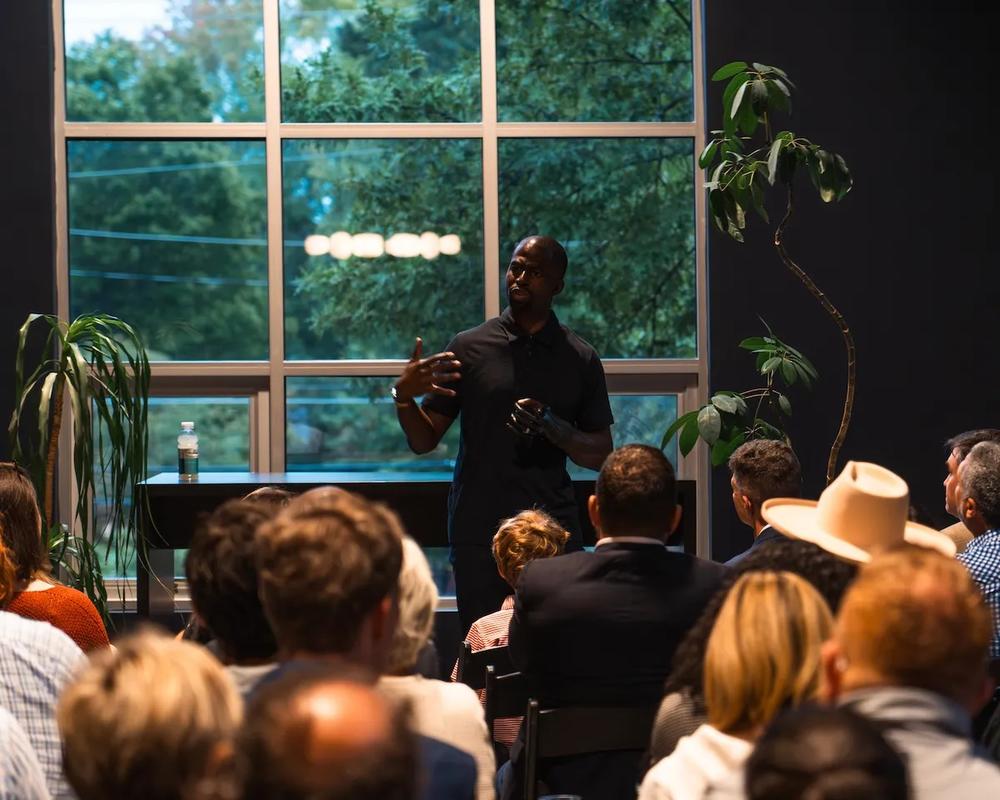
Caption
Mohamed Massaquoi speaking to a crowd at an event in Brookhaven on Sept. 11 (Photo courtesy of WITH Agency). Mohamed Massaquoi speaking to a crowd at an event in Brookhaven on Sept. 11, 2024.
Credit: Photo courtesy of WITH Agency

Mohamed Massaquoi speaking to a crowd at an event in Brookhaven on Sept. 11 (Photo courtesy of WITH Agency). Mohamed Massaquoi speaking to a crowd at an event in Brookhaven on Sept. 11, 2024.
Mohamed Massaquoi speaks at a lot of events. But, despite how long he’s been doing it, he didn’t really become comfortable with the idea of public speaking until recently.
“You have to be vulnerable. You have to be authentic,” Massaquoi said. “You have to say something that isn’t so generic that you leave [the audience] on a cliffhanger and they don’t know what to do.”
In Massaquoi’s case, he has to be extremely vulnerable. In 2017, Massaquoi — who played football at the University of Georgia and in the NFL — was in an ATV accident that resulted in the loss of his left hand. The doctors were able to save the former wide receiver’s left thumb, but he now wears a prosthetic in place of his other four fingers.
As a wide receiver, Massaquoi’s hands were his most important assets. After the accident, he had to adjust. Massaquoi now regularly speaks about navigating change and working through big challenges — recently, he spoke at an event in Brookhaven. A few years after the accident in 2020, he founded a company called VESSOL, channeling his masters degree in organizational psychology into a career where he aims to help companies and workplaces motivate their employees.
Massaquoi said he has always been fascinated by people — it’s part of what interested him about football in the first place. He loved the camaraderie, the bonding, and the team element that came along with the sport. From an early age, he wanted to play at a high level. He played at the University of Georgia from 2005-08, and was drafted by the Cleveland Browns in 2009.
“Looking at what Georgia was building through Coach [Mark] Richt, they got off to a really fast start and were having success. It was a program on the rise with a great pedigree.”
The football part of his life might be over now, but the athlete inside of Massaquoi still brings the things he learned playing football to his job now. After the accident, he learned that the road to recovery was not single-lane.
“It’s not an individual journey,” he said. “There’s a lot of moving pieces of who helps, who’s there, how the team functions, what you actually become after.”
For Massaquoi, the after included not only a lot of support from family and friends, but from therapy as well. In an interview about a year ago at the University of Georgia’s Terry College of Business, Massaquoi said what surprised him about his run in therapy was how much the conversation didn’t necessarily revolve around what happened to his hand, but other aspects of his life. He came to the realization that maybe therapy should have been something he was doing all along.
“There are certain things that remain true whether you go through a traumatic experience or not,” Massaquoi said. “The more that one does the deep work to try to start to take accountability of what they need to do to get to the other side, they realize that a lot of what they may be struggling with is actually solvable.”
Massaquoi said he feels a responsibility to help others, but that responsibility is rooted in a place of experience. He said he doesn’t really believe in the idea of a “hero’s journey,” or that one person has all of the answers — including himself. The ultimate solution will depend on the person, but he hopes his experiences can at least give people a starting point.
“I’m not going to tell a person that they have to wake up at 5 a.m., and they have to go do this and that,” he said. “All those things, it may work for somebody, but it may not work for someone else. It’s more so giving someone a reference point of how they can think about making progress and giving enough of a reference point to where they have options of what makes sense to them.”
This story comes to GPB through a reporting partnership with Rough Draft Atlanta.